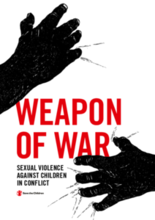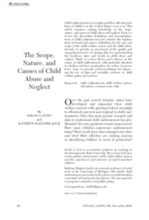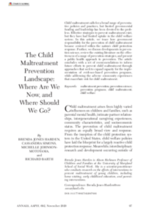Displaying 91 - 100 of 1089
This report presents the very first quantitative analysis of the risk of sexual violence against children in conflict for the period 1990-2019.
This article examines existing knowledge on the scope, nature, and causes of child abuse and neglect in the U.S.
In this article, the authors trace how government responsibility for the prevention of child maltreatment became centered within the U.S. child protection response.
The two primary objectives of this study were 1) to compare recent child abuse (physical, emotional, and sexual) between orphaned and separated children and adolescents’ (OSCA) living in institutional environments and those in family-based care; and 2) to understand how recent child abuse among street-connected children and youth compared to these other vulnerable youth populations.
This study was designed to evaluate the content of US state-sponsored online mandated reporter training in order to identify gaps and need for improvement in mandated reporter training.
The authors of this study used data from a longitudinal randomized controlled trial of foster care for institutionally reared children to examine whether caregiving quality and stressful life events (SLEs) in early adolescence (age 12) influence patterns of hypothalamic–pituitary–adrenal (HPA) axis and sympathetic nervous system (SNS) reactivity.
This research examines the intersection of cross-cultural practice and child maltreatment investigations.
This paper examines the role of interprofessional collaboration in the identification and reporting of a child in need.
This study aims to examine the consequences of the last great recession on the child protection system (CPS) in Spain, to estimate whether there is any kind of relationship between the conditions of socio-economic crisis and its protective activity.
This paper explores the impact of the Power to Kids: Respecting Sexual Safety programme, which involved capacity‐building workers to have ‘brave conversations’ with children and young people in residential care.



